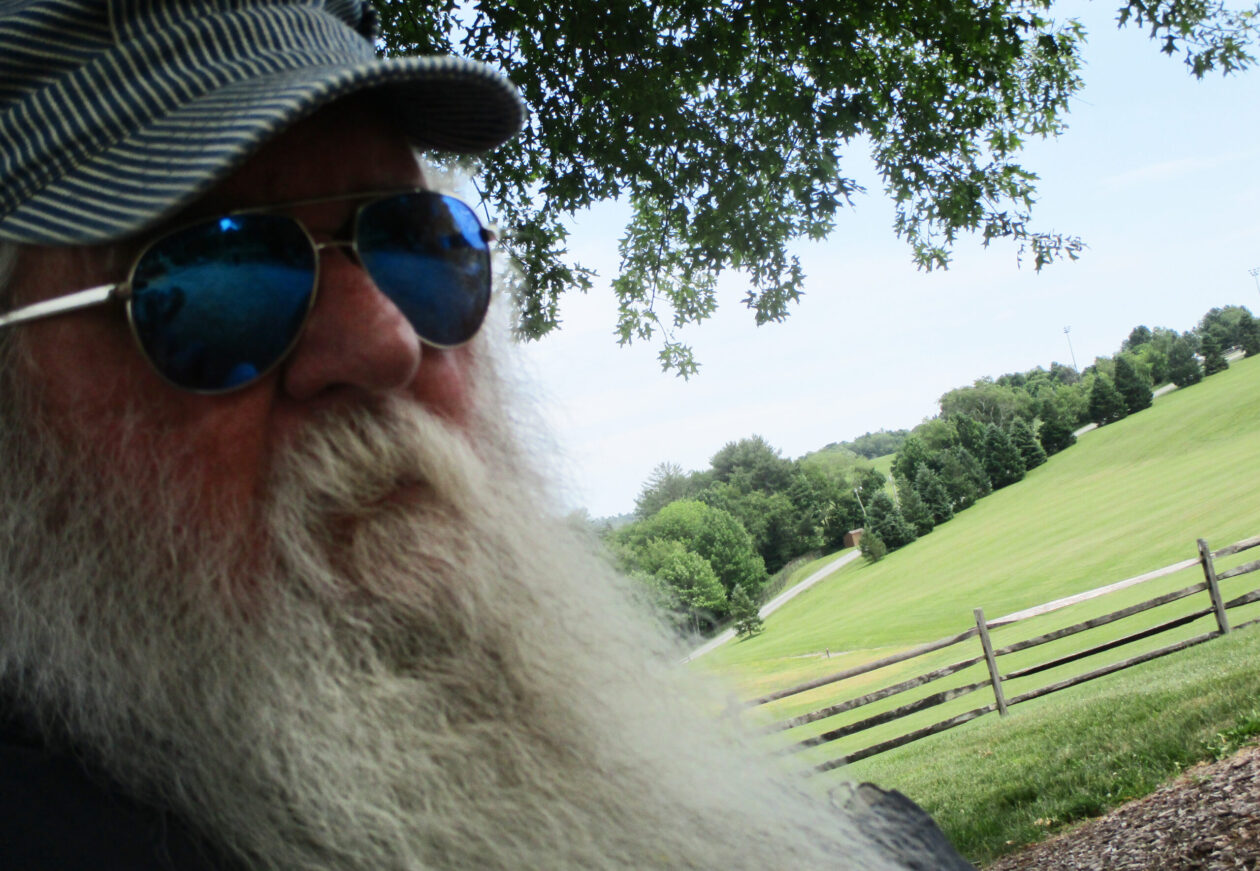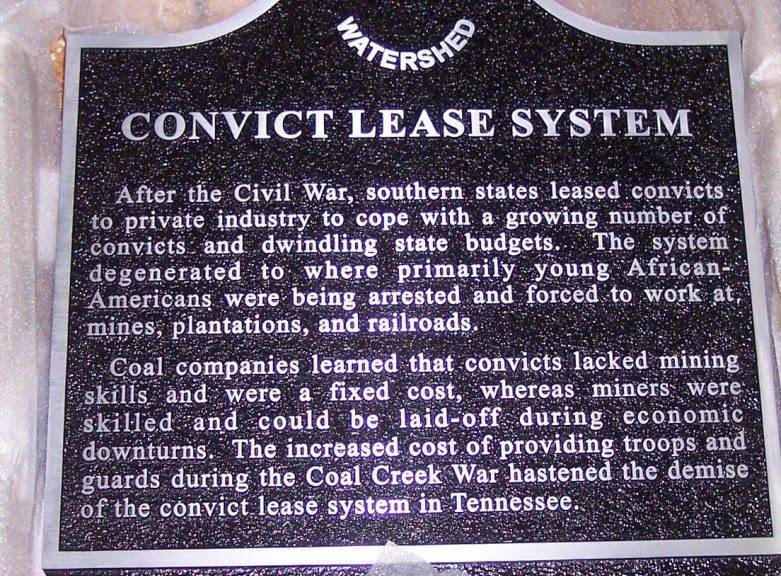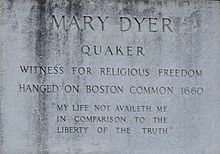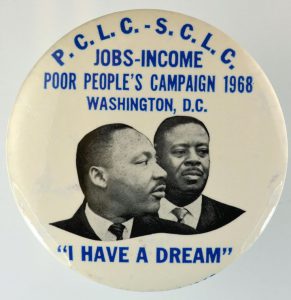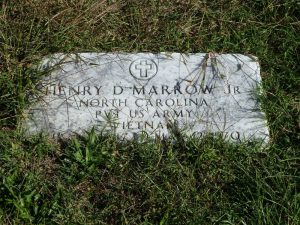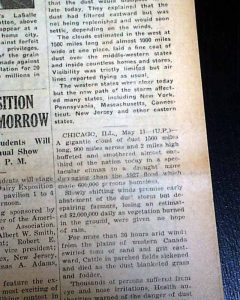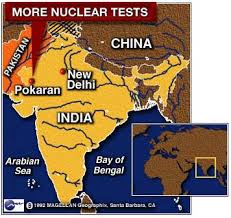May 11 Peace Love Art Activism
DEATH PENALTY
SEPARATION OF CHURCH AND STATE
May 11, 1682: the Massachusetts General Court repealed two laws that had banned the celebration of Christmas and had authorized capital punishment for expelled Quakers returning to the colony. (History of Massachusetts blog article) (DP, see June 10, 1692; Separation, see April 22, 1864)
May 11 Peace Love Art Activism
BLACK HISTORY
Leasing state convicts
After the Civil War, Georgia and other Southern states faced economic uncertainty. Dependent on enslaved black labor that was no longer available after emancipation and ratification of the Thirteenth Amendment, Southern economies struggled to find a new solution. For many, leasing state convicts to labor for private businesses seemed the perfect answer.
Ratified in 1865, the Thirteenth Amendment prohibited involuntary servitude “except as punishment for crime” and seemingly permitted the forced labor of prisoners. At the same time, Southern prison populations had grown greatly following the Civil War, and that increase was disproportionately fueled by newly-emancipated black men and women incarcerated for violating discriminatory Black Codes that criminalized unemployment and vagrancy and severely punished even the most minor thefts.
On May 11, 1868, in the midst of Reconstruction, Georgia Provisional Governor Thomas Ruger leased 100 black prisoners to William A. Fort of the Georgia & Alabama Railroad for one year for $2500 under an agreement that made Mr. Fort responsible for their well-being. Sixteen prisoners died before the end of the contract. Undeterred, Georgia officials expanded the system the following year, leasing all 393 state prisoners to work on another railroad. Over the next several years, convict leasing in Georgia proved both deadly and profitable. The state legislature routinely turned a blind eye to reports of inhumane treatment and even murder and, in 1876, authorized the state to enter into long-term, twenty-year convict leasing contracts valued at $500,000. (BH, see July 9; C & P, see February 22, 1922)
KKK in Birmingham
May 11, 1963: Klansmen in Birmingham set off two bombs in an African-American neighborhood and rioting broke out, despite pleas by movement leaders for nonviolence. (see May 13)
Benjamin Brown
May 11, 1967: Benjamin Brown, a former civil rights organizer, was shot in the back in Jackson, Miss. He had walked with a friend into a café to pick up a sandwich to take home to his wife. On his way back, he encountered a standoff between law enforcement officers and students from Jackson St College, who had been hurling rocks and bottles at them. Brown was hit in the back by two shotgun blasts. No arrests were ever made. In 2001, a Hinds County grand jury reviewing the case blamed two deceased officers: Jackson police officer Buddy Kane and Mississippi Highway Patrolman Lloyd Jones. The Brown family filed a lawsuit, and the city of Jackson settled for $50,000. (Northeastern dot edu article) (see May 15)
Poor People’s Campaign
May 11, 1968: the Poor People’s Campaign arrived in Washington, D.C. A shantytown called “Resurrection City” was erected as a tribute to the slain Martin Luther King Jr. He had conceived the campaign, which was led by his successor at the head of the Southern Christian Leadership Conference, Ralph David Abernathy. (Poor Peoples Campaign article) (see May 12)
Race Revolts
May 11, 1970
- Henry Marrow, a 23-year-old black Vietnam veteran, walked toward a white-owned store in Oxford, NC. Something Marrow said was interpreted as a slight to a young white woman. He was chased from the store by owner Robert Teel and his two sons, who beat and then fatally shot him. The events sparked a mass riot in the streets of Oxford by black residents that same night. After the three men were arrested, they were tried by an all-white jury and acquitted of all charges, despite the eyewitness accounts and inconsistent testimonies of the suspects. (NCDCR article)
- in Augusta, Ga., a race riot after a prison killing of a mentally handicapped black teenager at the hands of prisoners. Black residents in the town frustrated by the treatment of police and the conditions of the jail marched through the town before it was a full-fledged riot. By the next day, six people were dead and more than 60 were injured after the melee. (Newscone article) (BH, see June 16, 1970; RR, see October 12, 1972)
James Byrd Jr
May 11, 2004: Joshua Lee Talley, 19 and John Matthew Fowler, 18, were arrested and charged with criminal mischief for desecrating James Byrd Jr.’s grave with racial slurs and profanities. (BH, see June 6; LBGTQ, see May 17; Shepard & Byrd, see May 26, 2005; see S & B for more)
AZ Bans Ethnic Studies
May 11, 2010: Arizona Governor Jan Brewer signed into law HB 2281, a legislative act designed to end Ethnic Studies classes in the state. This law banned schools from engaging with certain books written by authors of color and temporarily eliminated the Mexican American Studies program in Tucson schools, preventing hundreds of students from engaging with their history and culture within a school setting until it was found unconstitutional in 2017. [EJI article] (next BH, see Sept 6)
BLACK & SHOT and Ahmaud Arbery
May 11, 2020: Georgia Attorney General Chris Carr named Joyette M. Holmes to oversee the case of Ahmaud Arbery
Holmes, comes from Cobb County in the Atlanta metropolitan area, where she was the first African-American to serve as district attorney. She was the fourth prosecutor assigned to lead a case that has bounced among district attorneys and law enforcement agencies. [NYT article] (next AA, see May 21 or see AA for expanded chronology)
May 11 Peace Love Art Activism
US Labor History
Eugene Victor Debs
May 11, 1894: led by Eugene Victor Debs of the American Railway Union, the future founder of the Socialist Party of America, workers at the Pullman factory begin a strike that leads to the death of 34 people after violence breaks out between workers and federal troops deployed by President Grover Cleveland. (ThoughtCo article) (Anarchism, see August 17, 1894; Labor, see June 26)
César E. Chávez
May 11 – June 4, 1972: Chávez fasted for 25 days in Phoenix over a just-passed Arizona law banning the right of farm workers to strike or boycott. (next Chavez, see June 1973)
May 11 Peace Love Art Activism
Environmental Issues
Dust storm
May 11, 1934: a massive storm sent millions of tons of topsoil flying from across the parched Great Plains region of the United States as far east as New York, Boston and Atlanta. (Finding Dulcinea article)(see April 14, 1935)
Chlorofluorocarbons
May 11, 1977: the U.S. announced a timetable for the phase out of the use of chlorofluorocarbons (CFCs) in aerosol products. By December 15, 1978, companies must stop using chlorofluorocarbons as propellants in aerosol products. (see January 29, 1978)
May 11 Peace Love Art Activism
Women’s Health
Dr John Rock
May 11, 1960: the FDA approved Searle’s contraceptive pill, Enovid, the first drug approved in order to prevent a medical happening. In 1959, Searle had applied to license the “Pill” – an oral progestin – as a contraceptive. They chose Dr John Rock to present the findings of the experiences of 897 women before the Food and Drug Administration (FDA).
Rock (1890-1984) was an American obstetrician and gynecologist who was an expert in human fertility, the requirement at the time was that a drug must be proven safe and not necessarily effective. However, the young reviewer, who was aware of the implications of the Pill, was thorough in his examination, requiring further lab tests before approval. By 1964 some four million women were on the pill. (PBS American Experience article) (see “In December”)
Vietnam
Special Forces
May 11, 1961: President Kennedy approved sending 400 Special Forces troops and 100 other U.S. military advisers to South Vietnam. On the same day, he ordered the start of clandestine warfare against North Vietnam to be conducted by South Vietnamese agents under the direction and training of the CIA and U.S. Special Forces troops. Kennedy’s orders also called for South Vietnamese forces to infiltrate Laos to locate and disrupt communist bases and supply lines there. (see June 16)
May 11 Peace Love Art Activism
see May 11 Music et al for more
Canadian Beatles album
May 11, 1964: recorded in 1963, the Beatles released The Beatles’ Long Tall Sally album in Canada on the Capital Canada label. It was the last time such a type of release was done. (see May 30 – June 5, 1964)
The Byrds
May 11, 1965: The Byrds made their TV debut with “Mr. Tambourine Man” on NBC’s “Hullabaloo.” (see June 16)
The Road to Bethel
May 11, 1970: release of the triple soundtrack album ‘Woodstock’ in the US, going gold within two weeks. (see Road for expanded story)
John Lennon
May 11, 1972: John Lennon appeared on the ‘Dick Cavett Show’, claiming he was under surveillance from the FBI. (see May 17)
All Those Years Ago
May 11, 1989: the collaborative effort by the three remaining Beatles, All Those Years Ago, released. (see June 22)
May 11 Peace Love Art Activism
LGBTQ
Gay entrapment
May 11, 1966: NYC Police Commissioner Howard Leary instructed policemen not to lure gays into breaking the law and to “make every effort” to find witnesses whenever an arrest occurs involving homosexual advances to a plainclothesman. (see “In August“)
Church of Jesus Christ of Latter-day Saints
May 11, 2017: the Church of Jesus Christ of Latter-day Saints announced that it would pull an estimated 130,000-180,000 Mormon teenagers ages 14-18 from Boy Scouts starting next year. The Boy Scouts’ “Varsity” and “Venturing” programs for older teens had become difficult to implement within the religion, which opposed gay marriage and taught its members that being in a homosexual relationship is a sin. (LGBTQ, see June 23; BSA, see Oct 9)
Oklahoma
May 11, 2018: Oklahoma Gov. Mary Fallin signed a law that said no child-placement agency would be required to put children up for adoption or in foster care in situations that “violate the agency’s written religious or moral convictions or policies.”
The governor said the law would not restrict the ability of LGBT people from getting a child through adoption or foster care, but critics disagreed. (see June 4)
May 11 Peace Love Art Activism
Daniel Ellsberg/Pentagon Papers
May 11, 1973: Judge Byrne granted a mistrial due to what he deemed to be serious government misconduct. All charges against Ellsberg and Russo dropped. (see Papers for expanded story)
May 11 Peace Love Art Activism
Nuclear/Chemical News
Nuclear Nonproliferation Treaty
May 11, 1995: signatory nations agreed to extend the Nuclear Non Proliferation Treaty (NPT) (see July 1, 1968) indefinitely. The NPT is an agreement signed by 189 countries to control the spread of nuclear weapons and nuclear technology based on the principles of disarmament, non-proliferation, and the use of nuclear technology for peaceful purposes. The treaty was opened for signature in 1968 with a provision for review conferences every five years. During the 1995 review conference in New York City, member countries decided to keep the treaty open indefinitely. (UN article) (see September 24, 1996)
India
May 11, 1998: India conducted 3 underground nuclear tests in Pokhran, India. (see May 28)
May 11 Peace Love Art Activism
Crime and Punishment
May 11, 2017: Attorney General Jeff Sessions ordered federal prosecutors to pursue the toughest possible charges and sentences against crime suspects, reversing Obama administration efforts to ease penalties for some nonviolent drug violations.
In an eight-paragraph memo to the nation’s prosecutors, Mr. Sessions returned to the guidance of President George W. Bush’s administration by calling for more uniform punishments — including mandatory minimum sentences — and directing prosecutors to pursue the strictest possible charges. (NYT article) (see Aug 18)
May 11 Peace Love Art Activism
Voting Rights
May 11, 2017: President Trump signed an executive order aimed at investigating alleged vote fraud. The order established a commission to review alleged voter fraud and voter suppression throughout the American election system. Vice President Mike Pence headed the group, called the “Presidential Commission on Election Integrity.” Kansas Secretary of State Kris Kobach served as vice chair. The panel was tasked with studying “vulnerabilities” in the voting system, as well as potential impacts on “improper voting, fraudulent voter registrations, and fraudulent voting.” (NBC News article) (see May 22)
